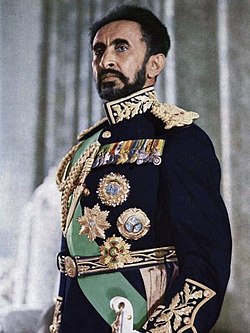Rastafari
Rastafari
The Rastafari movement is a religion and social movement that originated in Jamaica during the 1930s. It is based on a specific interpretation of the Bible and is centered around the worship of Haile Selassie I, the former Emperor of Ethiopia, whom Rastafarians believe to be the reincarnation of Jesus Christ and the Messiah.
Beliefs[edit]
Rastafari beliefs are deeply rooted in the idea of Pan-Africanism and the return to Africa as a homeland. The movement emphasizes the importance of living in harmony with nature, the rejection of materialism, and the pursuit of spiritual enlightenment.
Haile Selassie I[edit]

Rastafarians regard Haile Selassie I as the living God, "Jah," and the returned Messiah who will lead the peoples of Africa and the African diaspora to freedom. His coronation in 1930 was seen as the fulfillment of a prophecy.
The Bible[edit]
Rastafarians use the Bible as their holy scripture, but they interpret it in a way that emphasizes the African identity and the oppression of the African people. They often refer to the Bible as "The Black Man's Bible."
Livity[edit]
"Livity" is a key concept in Rastafari, referring to a lifestyle that reflects the natural order and the divine presence in all things. It includes a vegetarian diet, known as "Ital" food, which is believed to increase life energy.
Practices[edit]
Rastafarians engage in various practices that reflect their beliefs and values.
Dreadlocks[edit]
The wearing of dreadlocks is a symbol of the Rastafari movement, representing a covenant with God and a rejection of Babylonian culture.
Ganja[edit]
The use of cannabis, or "ganja," is considered a sacrament in Rastafari, used in religious ceremonies to aid in meditation and spiritual growth.
Music[edit]
Reggae music, popularized by artists like Bob Marley, is closely associated with Rastafari. It serves as a vehicle for spreading the movement's message and values.
History[edit]
The Rastafari movement began in the 1930s in Jamaica, influenced by the teachings of Marcus Garvey, who advocated for the return of the African diaspora to their ancestral lands. The movement gained international recognition in the 1970s, largely due to the global popularity of reggae music.
Cultural Impact[edit]
Rastafari has had a significant impact on global culture, particularly in music, fashion, and language. The movement has inspired numerous artists and musicians and has contributed to the spread of reggae music worldwide.
Also see[edit]
References[edit]
- Barrett, Leonard E. (1997). The Rastafarians: Twentieth Anniversary Edition. Beacon Press.
- Chevannes, Barry (1994). Rastafari: Roots and Ideology. Syracuse University Press.
| Rastafari | ||||||||||
|---|---|---|---|---|---|---|---|---|---|---|
|
Ad. Transform your life with W8MD's Budget GLP-1 injections from $49.99


W8MD offers a medical weight loss program to lose weight in Philadelphia. Our physician-supervised medical weight loss provides:
- Weight loss injections in NYC (generic and brand names):
- Zepbound / Mounjaro, Wegovy / Ozempic, Saxenda
- Most insurances accepted or discounted self-pay rates. We will obtain insurance prior authorizations if needed.
- Generic GLP1 weight loss injections from $49.99 for the starting dose of Semaglutide and $65.00 for Tirzepatide.
- Also offer prescription weight loss medications including Phentermine, Qsymia, Diethylpropion, Contrave etc.
NYC weight loss doctor appointmentsNYC weight loss doctor appointments
Start your NYC weight loss journey today at our NYC medical weight loss and Philadelphia medical weight loss clinics.
- Call 718-946-5500 to lose weight in NYC or for medical weight loss in Philadelphia 215-676-2334.
- Tags:NYC medical weight loss, Philadelphia lose weight Zepbound NYC, Budget GLP1 weight loss injections, Wegovy Philadelphia, Wegovy NYC, Philadelphia medical weight loss, Brookly weight loss and Wegovy NYC
|
WikiMD's Wellness Encyclopedia |
| Let Food Be Thy Medicine Medicine Thy Food - Hippocrates |
Medical Disclaimer: WikiMD is not a substitute for professional medical advice. The information on WikiMD is provided as an information resource only, may be incorrect, outdated or misleading, and is not to be used or relied on for any diagnostic or treatment purposes. Please consult your health care provider before making any healthcare decisions or for guidance about a specific medical condition. WikiMD expressly disclaims responsibility, and shall have no liability, for any damages, loss, injury, or liability whatsoever suffered as a result of your reliance on the information contained in this site. By visiting this site you agree to the foregoing terms and conditions, which may from time to time be changed or supplemented by WikiMD. If you do not agree to the foregoing terms and conditions, you should not enter or use this site. See full disclaimer.
Credits:Most images are courtesy of Wikimedia commons, and templates, categories Wikipedia, licensed under CC BY SA or similar.
Translate this page: - East Asian
中文,
日本,
한국어,
South Asian
हिन्दी,
தமிழ்,
తెలుగు,
Urdu,
ಕನ್ನಡ,
Southeast Asian
Indonesian,
Vietnamese,
Thai,
မြန်မာဘာသာ,
বাংলা
European
español,
Deutsch,
français,
Greek,
português do Brasil,
polski,
română,
русский,
Nederlands,
norsk,
svenska,
suomi,
Italian
Middle Eastern & African
عربى,
Turkish,
Persian,
Hebrew,
Afrikaans,
isiZulu,
Kiswahili,
Other
Bulgarian,
Hungarian,
Czech,
Swedish,
മലയാളം,
मराठी,
ਪੰਜਾਬੀ,
ગુજરાતી,
Portuguese,
Ukrainian